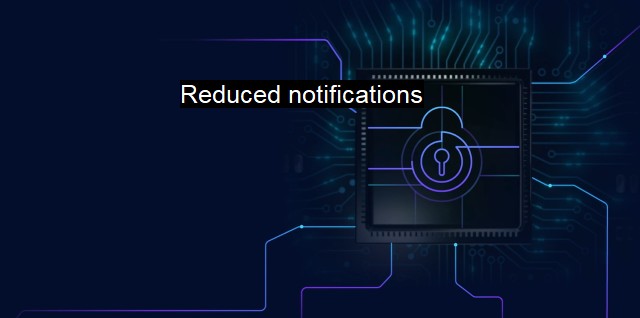What are Reduced notifications?
Cybersecurity in the Age of Notifications: The Benefits of Reduced Notifications for Effective Antivirus Software
Reduced notifications is a term often used within the context of cybersecurity and antivirus software. the term refers to a feature in software applications where fewer notifications than usual are sent to the user. It is a somewhat overlooked, but crucial feature in ensuring the optimal functionality and usability of cybersecurity software, enabling users to carry on with their tasks with minimal disruptions.For the ordinary user, juggling the demands of work or personal tasks and staying aware of potential security threats can be daunting. Notifications from antivirus or cybersecurity apps provide important alerts regarding these threats. they can often occur so frequently that they become a nuisance rather than a valuable tool, leading some users to neglect or ignore these important warnings. Therefore, cybersecurity companies create reduced notifications options in their software to strike a balance between maintaining users' awareness and allowing them to concentrate on their routines.
Reduced notifications is not about providing less security but rationalizing how and when notifications are delivered. Cybersecurity platforms and antivirus software with this feature intelligently filter notifications and decide what requires immediate user attention. The software classifies risks based on their threat levels. Critical risks may require immediate notifications, while low-level risks may be logged and communicated in a single daily or weekly summary notification, thereby reducing notification frequency.
If an advanced antivirus software is scanning hundreds or thousands of files every hour and each file's scan information pops up as a notification, it would be distracting to the user. reduced notifications only alert the user when a significant threat is detected, thus enhancing the overall user experience. The non-critical detected threats or completed scans would normally be stored in logs accessible via the software interface for users who need insight into the smaller activities of their antivirus application.
Reduced notifications feature also benefits the resources of the device the cybersecurity software is installed upon. Every notification generated requires computational power, RAM, and even additional battery life in the case of mobile devices. By reducing the amount of overall notifications, not only the user experience is enhanced but also the performance and longevity of the device are preserved.
It's crucial to understand that reduced notifications and lowered cybersecurity are not synonymous. All risks, regardless of whether they instantly notify the user or not, are addressed appositely by the software. The antivirus software is not compromising on scan depth or quality; it merely distinguishes between what needs to trigger immediate user action and what does not.
Cybersecurity providers offering reduced notifications likewise prioritize user control. most will typically allow users to customize their notification preferences; whether they want to see all notifications, only the most important ones, or somewhere in-between. This personalization helps ensure that users stay informed about their system's health without feeling overwhelmed by information overload.
To round off, "reduced notifications" serves a vital role in today's cybersecurity landscape. It allows antivirus software to function more efficiently, balancing the need for critical alerts with the user's desire for fewer interruptions. It’s an intelligent approach to ensure crucial cybersecurity issues are known without compromising the user's productivity.

Reduced notifications FAQs
What does "reduced notifications" mean in cybersecurity and antivirus software?
Reduced notifications refer to the decrease in the number of notifications or alerts displayed in a cybersecurity or antivirus software interface. This means that notifications will only be sent when critical actions are being taken by the software, reducing the number of unnecessary notifications and improving the user experience.Why is reducing notifications important in cybersecurity and antivirus software?
Reducing notifications is important because it can help prevent notification fatigue, which can occur when users are overwhelmed by a large number of alerts, causing them to ignore or dismiss important notifications. By reducing the number of notifications, cybersecurity and antivirus software can ensure that users only receive notifications for important events or activities, improving their ability to respond to real threats.How can reduced notifications improve the overall security of a system?
Reduced notifications can improve the overall security of a system by ensuring that notifications are only sent for critical events or activities. This can help prevent users from becoming overwhelmed by a large number of notifications and missing important alerts. Additionally, reduced notifications can help prevent attackers from using notifications as a way to distract or deceive users, making it more difficult for them to carry out attacks.Can users customize their notification preferences with reduced notifications in cybersecurity and antivirus software?
Yes, users can typically customize their notification preferences with reduced notifications in cybersecurity and antivirus software. They can choose which types of notifications they want to receive and how frequently they receive them. This can allow users to tailor their notification settings to their specific needs and preferences, while still ensuring that they receive important alerts in a timely manner.| | A | | | B | | | C | | | D | | | E | | | F | | | G | | | H | | | I | | | J | | | K | | | L | | | M | |
| | N | | | O | | | P | | | Q | | | R | | | S | | | T | | | U | | | V | | | W | | | X | | | Y | | | Z | |
| | 1 | | | 2 | | | 3 | | | 4 | | | 7 | | | 8 | | |||||||